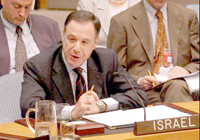Israeli Ambassador Says Time May Be Right for Peace
Speaking at LAW, Dan Gillerman calls for brave leaders

It has been nearly 60 years since the United Nations partitioned what was then the British Mandate for Palestine, which led to the creation of Israel and engendered a bloody conflict between that state and many of its neighbors, including the Palestinian people. Nevertheless, Dan Gillerman, Israel’s ambassador to the United Nations, is optimistic that a unique opportunity for peace may now be within reach.
“I believe we have an opportunity that we did not have before to finally bring some solace and some peace to the very tough neighborhood that we live in,” said Gillerman, speaking yesterday to an audience of about 100 at Boston University’s School of Law.
Ironically, Gillerman noted, this opportunity may have sprung from the recent increase in turmoil across the region — from battles between the Israeli Defense Forces and Palestinian militants to the daily sectarian killings in Iraq to last summer’s bloody and inconclusive war between Israel and Hezbollah in southern Lebanon, which killed 119 Israeli soldiers and hundreds of Lebanese civilians.
“I think the terror we witness every day and that very bitter war we experienced last summer may have laid the groundwork,” said Gillerman. “We are seeing many moderate Muslim states finally realizing that it’s time to put an end to the violence of Islamic extremism. I believe there are far more moderates and that most Muslims want to live in peace.”
Gillerman’s visit was the second event in a two-part series on the Israeli-Palestinian conflict, organized by the International Students Consortium (ISC). Two weeks ago, Afif Safieh, the Palestinian Liberation Organization’s ambassador to Washington, D.C., also spoke at LAW and called for a two-state solution.
“Our coexistence is unavoidable,” Safieh told his BU audience. “Our two societies are burdened, or plagued, or blessed, with too much theology and too little geography.”
Yesterday, Gillerman echoed that basic sentiment, but added his opinion that “the real problem in the region is the terror and the extremism which does not stem from the Israeli-Palestinian conflict. There is today a real, bitter fight between the moderates and the extremists.”
He repeatedly contrasted moderate Muslim leaders with the rulers of Iran, a country whose president, Mahmoud Ahmadinejad, Gillerman labeled “a lunatic.”
Gillerman became Israel’s ambassador to the U.N. in 2003 after a long career as a businessman and leading economic thinker. He was the first Israeli representative to successfully introduce a resolution to the U.N. General Assembly when in 2005 that body voted unanimously to designate January 27 as Holocaust Remembrance Day. That same year he was elected vice president of the General Assembly.
At the BU event, Gillerman was introduced by Bilal Bilici (CAS’07), ISC president, University Provost David Campbell, and Charles Dunbar, a professor of international relations in the College of Arts and Sciences and a former ambassador to Qatar and Yemen. According to Dunbar, part of what has kept Israel and the Palestinians from achieving peace is that it is “less painful” for their leaders “to live in the difficult situation that now prevails than it is to take the steps that could be taken to break that stalemate and bring about a peaceful settlement.”
Dunbar also placed some blame on the United States. “The Bush administration has been less active [in the peace process] throughout its time in office," he said. "As a result, the peace effort has languished."
Gillerman also called for more help from the international community to bring peace between Israel and the Palestinians. In addition to the rise of moderate Arab leadership, he said, the world must create “a vast plan of injecting money, incentives, and projects into the Middle East, and especially the Palestinian world, to use the economy and business as an engine to create confidence-building measures and to prove to both sides that peace has its dividends.”
After Gillerman’s talk, about 20 audience members approached a microphone to ask about issues ranging from the media portrayals of the conflict to the willingness of the Israeli government to remove Jewish settlements on disputed land that Israel captured in the 1967 Six Day War.
Several of the students, who had attended last month’s talk by the PLO ambassador, came away persuaded that both men truly want peace.
“Both ambassadors were extremely optimistic," said Ghenwa Hakim (CAS’08), vice president of BU’s Arab Student Association. "It’s reassuring to hear that optimism from both sides."
“Both sides emphasized dialogue and how leadership is important,” added Adina Vogel (CAS’09), president of the Palestinian-Israeli Peace Alliance.
And Gillerman himself ended his address with a call for “brave leaders” who could bring the two sides together.
“I believe that if the Palestinian people produce such a leader," he said, "if they produce someone who is willing to rein in the terror and recognize Israel, that he will find in the Israeli leadership a partner who will go very far with him to assure that those two peoples, bleeding and wounded and tired, will be able to live in peace."
Chris Berdik can be reached at cberdik@bu.edu. Nicole Laskowski can be reached at nicolel@bu.edu.